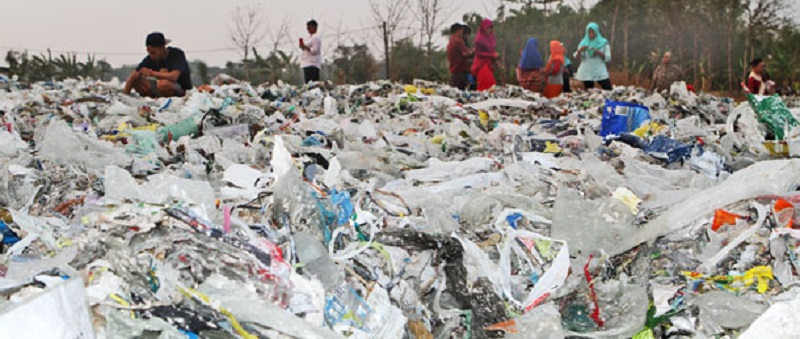At the meeting of the Basel Convention, the Basel Action Network (BAN) and member organisations of the Break Free from Plastic movement (BFFP) in a side event on Tuesday, June 14, 2022, presented evidence of continued plastic waste trade, that is exported primarily from the rich developed countries to weaker economies, and charged these exporting countries with failing to uphold the agreements to control plastic waste exports made at the Basel Convention in 2019, which came into force on January 1, 2021.

Among the 2021 trade data (Comtrade) findings presented by BAN and BFFP organisations:
- The European Union decided unilaterally to simply not enforce the Basel Rules for trade between member states.Canada similarly decided to ignore the rules for their plastic waste trade with the US.
- Japan is the world’s leading exporter of plastic waste to weaker economies.
- The US is the second-largest exporting country and has recently begun dramatically increasing their exports to Mexico.
- The Netherlands has become a conduit for exporting European plastic waste to Asia.
- The UK is shifting its exports from Turkey to Asia via the Netherlands.
- The US and EU illegally exported approximately 20,500 containers of PVC plastic waste last year.
Jim Puckett, executive director of BAN, said: “A year after the Amendments, major exporting and importing countries like Japan, the Netherlands, Germany and the UK are running away from the obligations they all agreed to undertake. They are simply business as usual, only this time the trade is illegal.
“We call on Basel Parties to Member States to fully enforce the Plastic Waste Amendments and for countries to ratify the Basel Ban Amendment, which prohibits OECD countries from exporting hazardous waste.”
Representatives of South Africa, Nigeria, Indonesia, Malaysia, and Thailand presented data, photo-documentation and described in harrowing detail the dumping and burning of plastic wastes caused by so-called plastics recyclers operating in their territories.
BFFP Asia-Pacific’s Waste Trade Project Coordinator, Pui Yi Wong: “Communities in the Global South – Asia-Pacific region, Latin America, and Africa – are suffering from pollution caused by foreign plastic waste. The immediate remedy for so many of these situations is simply to uphold the law and enforce it diligently.
“However, dramatically reducing plastic production and consumption is the ultimate answer to the plastic waste crisis.”
Chandramouli Venkatesan, Researcher, India: “It is interesting that India largely depends on informal waste pickers for domestic plastic waste collection yet allows plastic waste imports.
“Any ad hoc policies without further data, such as the traceability of imported plastic waste and local recycling capacity, will only add to the existing environmental and health problems in India. Export of waste, pretending everything is being recycled elsewhere, is perpetuating the oppression and suppression of voiceless communities.”
Mageswari Sangaralingam, Senior Research Officer of Friends of the Earth Malaysia: “Since 2018, there has been a decrease in plastic waste imports to Malaysia, but compliance with the Basel Convention Plastic Waste Amendment rules can only be ascertained if all plastic waste imports are screened by enforcement agencies. On the ground, we can see that the environmental injustice continues with illegal waste trade, false declarations, and plastic content in e-waste, paper waste, textile waste, or waste-derived fuels shipments. Malaysia is still dealing with legacy waste and microplastics from the waste dumped on us in the guise of recycling and trade.”
Yuyun Ismawati Drwiega, Senior Advisor and Co-Founder, Nexus for Health, Environment, and Development (Nexus3) Foundation, Indonesia: “Parties need to do more than just change their policies and adopt the Basel Amendments on plastic wastes trade.
“All plastic waste and paper waste supply chains also need to change their practices – wastepaper companies in Indonesia have private plastic landfills! Policies and regulations also need to tackle the legacy of imported plastic waste dumping sites. Our monitoring results have shown dioxins and new POPs present in food chains around imported waste dumping sites.”
Punyathorn Jeungsmarn, Information and Communications Officer, Ecological Alert and Recovery – Thailand (EARTH), Thailand: “In the past few years, imports of plastic wastes in the forms of scraps, e-wastes, and others continue to cause pollution and damage Thailand’s circular economy.
“Efforts to control imports are undermined by legal loopholes. International cooperation is needed to end plastic waste imports from richer countries, to control plastic pollution throughout its life cycle, and to move away from its use and production.”
Dr. Leslie Adogame, Executive Director of Sustainable Research and Action for Environmental Development (SRADev), Nigeria: “Despite Nigeria’s ratification of the Basel Ban Amendment, it is alarming and saddening to see that an OECD country (United States), who is a non-Party to the Convention, is using Nigeria, a Party, as a dumping ground for PVC plastic waste. Notably, the new listing Y48 (plastic waste that requires special consideration and prior informed consent) includes organohalogen polymers such as PVC. As such, it is not legal for Nigeria to receive these PVC wastes from the United States.”
At the end of the side event, Break Free From Plastic (BFFP) Africa delivered a statement calling for the leaders of Africa to stop waste colonialism on behalf of 136 African civil society organisations.
Merrisa Naidoo, Plastic Campaigner, Global Alliance for Incinerator Alternatives (GAIA)/Break Free From Plastic (BFFP) Africa: “Africa is not yet free from colonialism; it continues to manifest itself in the form of waste trade that allows for the importation of toxic and non-recyclable waste into the African continent, eroding away at the foundations of liberty and environmental justice.”
